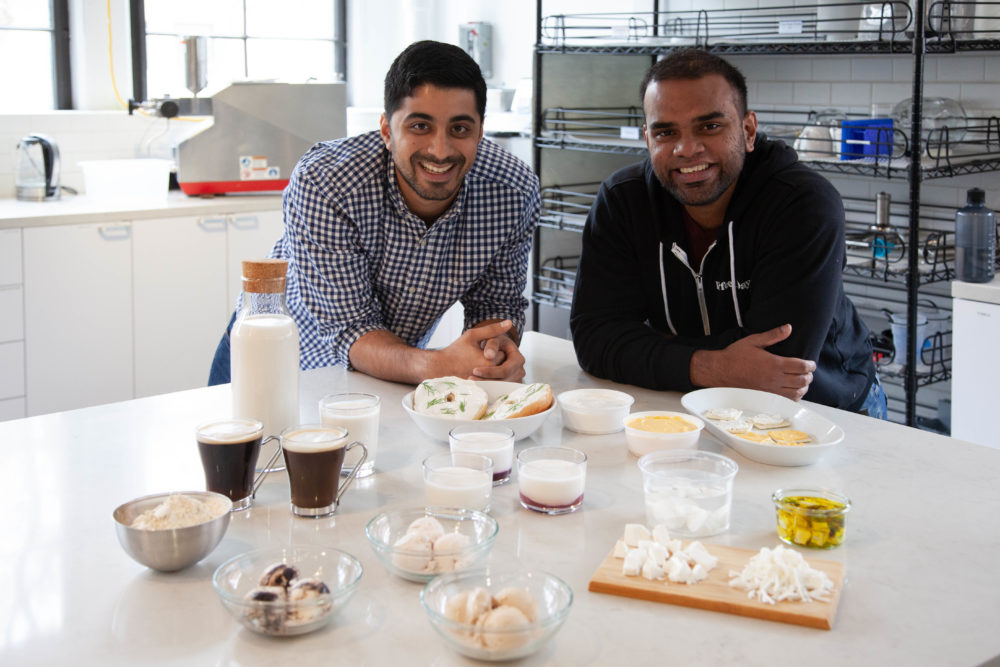Perfect Day, the Californian startup using plants and fermentation techniques to manufacture animal-free dairy products, has closed a $140 million Series C round of funding. Singapore state fund Temasek led the round joined by past investors including Hong Kong billionaire Li Ka-shing’s Horizons Ventures. The round takes the company’s total funding to $200 million making it one of the best-funded dairy alternative companies today.
The startup will use the funding to scale its production capacity — the company had a limited release of its flagship ice-cream product over the summer this year that quickly sold out — and build out partnerships with food companies to release more products onto the market. Perfect Day says it expects to announce these partnerships in 2020 but one that’s already public is a manufacturing deal with Archer Daniels Midland.
Perfect Day genetically engineers microflora – the name for a group of protein-producing organisms that includes yeast, bacteria, and fungi — to convert plant sugars into the milk proteins casein and whey that are essential in most dairy products. The whey and casein are identical to what you’d get from cow’s milk, according to Perfect Day, which then combines them with other ingredients to make its products, such as fat and water to make milk. The startup later filters out the microflora from the finished product, which Perfect Day says means it’s non-GMO.
There are many reasons put forward by alt dairy companies to bypass the dairy cow in the creation of dairy products ranging from human health to the environmental footprint of the dairy industry and these have been covered at length in the media, so when we had the chance for a brief chat with Perfect Day, we decided to cut to the chase with some in-depth questions about how they’re building the business.
What about all the new competition?
There’s no doubt this is a burgeoning segment of the foodtech industry overall. Alt dairy competitors are emerging in the form of Eclipse Foods, Dream Pops, Clara Foods, Ripple and New Culture to name a few using both cellular agriculture and fermentation techniques like Perfect Day as well as plant-based formulations. And sources tell us some of these are pretty great.
But Perumal Gandhi and Ryan Pandya, the cofounders, are not phased. They say they haven’t seen any companies with the same level of progress as Perfect Day — the startup is one of the longest-standing first launching in 2014 as Muufri — or the IP protection. “We do have a 5-year head start over new entrants in the flora-based dairy category and the IP landscape will also be challenging for others,” Gandhi told AFN. “We have patents in the works and approved that range from process to compositions of matter broadly around formulating food products with non-animal proteins.”
Why move to focus on B2B from B2C?
Gandhi said that it was always the strategy to work with food companies to provide ingredients for them to sell as food products as part of their mission to reach as many consumers as possible. “For us, it’s about having the biggest impact,” he said. “We know it’s best not to do a consumer brand to achieve that impact but instead work with multi-billion dollar food companies like ADM; that’s how we can reach more consumers and make a real difference.” So despite the success of this summer’s ice-cream launch, the company will focus more on partnerships going forward. But why leave all that value on the table for another company to make more money off? “We’ve thought about that and there’s nothing stopping us from launching more food products under our brand but we figure the only reason to think like that is to maximize short-term profits when we want to have a much longer-term impact on the world.”
Are shortages a concern?
This seemed relevant to ask considering what’s happened with other alt protein companies such as Beyond Meat and Impossible Foods over the summer, as well as Perfect Day’s own one-day sell-out situation.
“Shortages are inevitable; we’ve now shown that the process works at scale with the ice-cream launch but it’s also about scaling up the supply chain. Now we’ve partnered with groups like ADM and other numerous partners globally, we’ll be able to scale rapidly to hit the quantities relevant to the industry.”
Finding a way to scale the ice-cream product to meet the overwhelming demand while also creating a breadth of other offerings is top of mind, he added. The company plans to go from tens of metric tons of proteins to thousands of metric tons by 2022.
Is cheese the next product?
We asked this question because the company refers to creating casein through its process, which is a key component of cheese. As expected, he wouldn’t get into specifics but said that casein and whey are used in all major milk proteins. “We will be working on every product that milk can turn into,” said Gandhi.
How many people are they hiring and where?
The team is currently around 75-strong and Perfect Day plans to just under double it in 2020, focused on its locations in California. The company is operating in many different countries, he added, and with its primary investors coming from Asia, there’s no doubt the region will be of increasing importance to the company. “From consumers to governments to corporates, there’s no corner of the world that we haven’t heard from at this point.”





